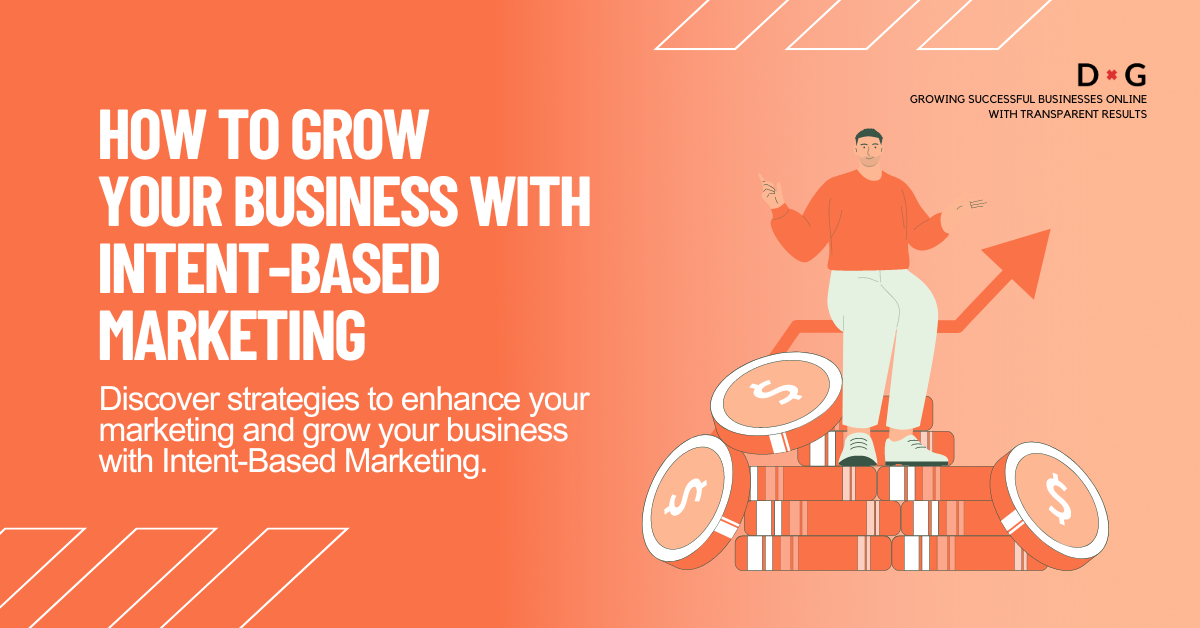
Understanding why people visit your website can be a big help for a business owner like you, especially if you’re planning to run PPC ads. Think about it: if you know what your visitors are searching for, you can create ads that directly address their needs. This not only improves the relevance of your ads but also increases the likelihood of them clicking through and converting. So, by leveraging intent-based marketing, you can make your PPC campaigns more targeted and effective. This ultimately driving better results for your business.
Ready to dive deeper into this strategy?
Let’s explore how you can use intent-based marketing to improve your business.
What Is Intent-Based Marketing?
Intent-based marketing is a strategy that focuses on understanding and targeting consumers based on their demonstrated intent to make a purchase or take a specific action.
It involves analysing various signals or indicators of consumer behavior to determine their intent, such as:
Search queries,
Website visits,
Social media interactions, and
Previous purchase history.
Example:
Suppose someone types “best laptops for graphic design” into a search engine. They are likely looking for information and want to compare different laptops.
You could respond by creating detailed content that compares various laptops. You can also emphasise how your products meet their specific needs.
Understanding Customer Intent with Data
Using tools like Google Analytics is important. These tools help you track what visitors do on your site, showing you what interests them.
This data is essential for understanding the patterns that tell you what your customers want.
Example:
You might notice that a lot of your visitors search for “affordable wedding dresses.” Using this information, you can create targeted blog posts, videos, and promotions.
That is to showcase your range of budget-friendly wedding dresses. This helps you attract more customers who are looking to buy wedding dresses at a lower cost.
Segmenting Customers Based on Intent
Once you understand what your visitors are interested in, you can categorise them by their intentions. This way, you can deliver the right message to the right people at the perfect time.
This makes your marketing more effective.
Example:
Create two groups—those who are just starting to look for a product and those who are ready to buy.
For the first group, send educational content like buying guides.
For the second group, send promotions or detailed product specifications. This might encourage a purchase.
Creating Content That Matches Customer Intent
Each group should receive content that matches their stage in the buying process. This approach ensures that the content serves a purpose. Effectively, meets your audience’s needs.
Example:
For customers who search for “how to choose the best running shoes,” provide a complete guide. This helps them understand what to look for.
For customers who search for “discounts on running shoes,” offer coupons or highlight sales in your content.
Optimising Content for Search Queries
It’s important that your content uses the same phrases and keywords that people type into search engines.
This practice helps ensure that your website shows up in search results. That is when potential customers are looking for information related to your products or services.
Example:
If you see many searches for “energy-efficient home appliances,” make sure your relevant product pages and blog posts are optimised with these keywords.
This could include titles like “Top 10 Energy-Efficient Home Appliances for Modern Homes.”
Using Retargeting to Re-engage Visitors
Retargeting is a technique where you target people with ads who have visited your site but left without buying anything. It’s a way to remind them of what they looked at and encourage them to return.
Example:
If a visitor looked at a particular product but didn’t purchase, you can show them ads for that product as they browse other sites.
Adding a limited-time discount through these ads can increase the likelihood of them returning to make a purchase.
Continuously Testing and Improving
The digital world changes rapidly, and what works today might not work tomorrow.
It is essential to regularly test different approaches to your website design, ad copy, and marketing strategies. This is to understand what works best for your audience.
Example:
Conduct A/B testing on different layouts for your product pages. You might find that one layout leads to higher sales than another.
Use this information to optimise all your product pages, which could lead to more sales and better customer satisfaction.
Conclusion
Intent-based marketing offers a strategic way to approach potential customers by aligning your marketing efforts with their specific needs and desires.
By focusing on the reasons behind their online activities, you can craft marketing strategies that are not only more appealing but also more likely to convert casual visitors into paying customers.
Start using these strategies today to see how they can transform your business’s approach to marketing and customer engagement.
So, while it can be highly effective for optimising paid ads, intent-based marketing principles can also the guide for content creation, email marketing, social media strategies, product development, and more. Essentially, any marketing effort can benefit from a deeper understanding of customer intent, regardless of whether it’s paid or organic.
Don’t have the time to manage paid ads yourself?
No worries! You can partner with a digital marketing agency to handle it for you. Check out the 6 Advantages of Working with a Digital Marketing Agency or you can directly message us to see how we can help boost your business.
